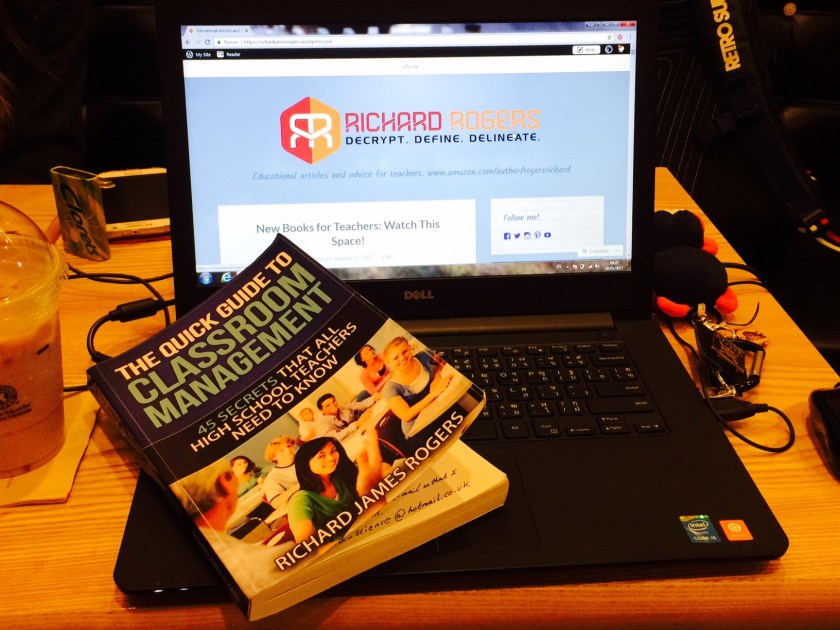An article by Richard James Rogers, author of the award-winning book: The Quick Guide to Classroom Management
Updated September 2021
Illustrated by Sutthiya Lertyongphati
The events in this article are based on actual occurrences. The names and, in some instances, the genders of individuals have been changed to protect the individuals’ privacy.
Accompanying podcast episode (audio version of this blog post, read by Richard):
‘Was machst du am Wochende auf?’ – That’s German for ‘What do you do on the weekend?’.
I haven’t studied German for 20 years, but I still remember the overwhelming majority of the words and phrases I was taught for my GCSE. I was lucky to have a brilliant German teacher. She, like all of my teachers at North Wales’ elite St. Richard Gwyn High School, was a Champion Teacher. Champion teachers like her literally have the power to make the wildest dreams of their students come true. They inspire, they care and don’t give up on you.

Let’s examine the features that all Champion teachers share. You’ll find that everything on this list is believable and achievable.
Champion teachers are:
- Good role models
- Dedicated and committed to their students
- Provide good feedback
- Use a dynamic and effective range of teaching methods
- Are caring
- Understand that the world is ‘getting smaller’
Whilst this is not exhaustive (please add any more you can think of in the comments below, on my Facebook page or please tweet to me), it does include the core elements that all Champion Teachers share. Let’s look at each one, one at a time.
Good role models
Champion teachers understand that they are always communicating something about themselves. The way they dress, their tone of voice, their posture, their habits, their cleanliness and even their table manners at lunchtime. They understand that students learn the majority of their behavioural and moral features not from what they hear in a typical classroom, but from the subliminal cues they pick up from their environment on a daily basis.

Charlotte was a high school chemistry teacher in a comprehensive school in England. She was also responsible for teaching lower school (KS3) Science. She enjoyed her job but didn’t really like teaching about health and fitness in the biology classes she was required to teach. She always found that the kids were disruptive and even make silly giggles whenever she talked about any topics relating to health. Then, one day, she found out why this was happening.
She found a note on scrap paper left on a student’s desk. The paper shown a drawing of Charlotte smoking a cigarette in the fume cupboard of her prep room. Then she remembered, a kid had walked in there one lunchtime a couple of years back and had caught her smoking. She went ballistic and told the boy off for walking into the prep room without knocking.
This story reminds me of a key phrase an old colleague of mine once said: “There’s no such thing as an off-duty teacher”.
How can a Science teacher lecture kids about the dangers of smoking when she’s smoking in school? How can the P.E. teacher maintain his credibility when he’s seen scoffing jumbo beef burgers downtown, posting pictures of himself binge drinking with his mates on social media and then turning up to school drained and out of shape?

Teachers need to be very careful about the images they portray of themselves to students, parents and the community. Watch out for the following:
- Turning up late: Be organized and be on time. That counts for lessons, meetings and your required start time for the day. How can we expect our students to be on time if we are not?
- Looking dirty or shabby: Keep your clothes in good order. Schedule your free time to get them all cleaned, dried and ironed. Shoes should be shiny and/or clean too, and try to wear different clothes each day. You don’t need to break the bank for designer labels – neatness and tidiness are the themes to remember here.
- Using foul language: Be particularly careful when talking with colleagues on corridors or open spaces. If kids are walking past and you’re swearing, it doesn’t look good and sets the wrong kind of example.
- Websites: Be careful what you look at on your mobile device or computer whilst in school. Students can suddenly turn up behind you and see what you’re doing. If it’s something that you wouldn’t want a student to see, then don’t view it.

Dedicated and committed to their students
What’s your aim when you go into school? Is it to just to ‘get through the day’ or is it to inspire your students?
Champion Teachers always start their day the right way. I wrote a blog post about effective morning routines for teachers a while back, but basically the idea is simple – set yourself up to win each morning.
My German teacher had lots of energy. She would even give up lunchtimes to help me with my speaking practice. My maths teacher would also give up her free time to help me with my questions and problems. Are you willing to do that?
Keep the success and wellbeing of your students your primary focus at all times and watch success and fulfillment magically come your way.
Provide good feedback
Feedback is one of the major cornerstones of success in education. In fact, John Hattie, the eminent Professor of Education at the University of Melbourne puts it this way:
The greater the challenge, the higher the probability that one seeks and needs feedback, but the more important it is that there is a teacher to provide feedback and to ensure that the learner is on the right path to successfully meet the challenges.
I wrote a lengthy blog post about the details of effective feedback here. However, the basics really are common sense:
- Students should always get their work back
- Students should know how they did, what went wrong, and how to improve their work
- Students should always be given the opportunity to improve their work
- A variety of assessment methods should be used (see my blog post here)
- Progress should be measured
- Assessment should be used to inform teaching (if students have not understood any content, then you need to plan ways to address that).
Use a dynamic and effective range of teaching methods
This would require a whole book in itself to talk about (and I highly recommend my debut book, The Quick Guide to Classroom Management, if you want a series of great tips and ‘teachniques‘ to enhance your teaching).
In essence, it all boils down to variety. Are you providing enough variety of tasks, activities, and challenges each lesson to engage your students?
You don’t need flashy technology or special skills to do this. Try implementing some simple learning games, use a greater variety of worksheets, tasks, and questions and try using model building, experimentation and practical activities in your classes.
Find out what works for your colleagues. Join online communities such as Facebook groups and get the ideas flowing!
Are caring
I was a very shy and sensitive little boy when I was 11 years old. I was bullied too, and I would always go and see my Head of Year for help when things got too tense. He always had a sympathetic ear and always had time for me.
I cringe when I look back at how childish I was back in Year 7. One snowy day I walked onto the playground and tried to join in the fun of throwing snowballs. Stupidly I went to the bottom of a grass verge and tried to throw snowballs uphill. I bet you know what happened next.
A flurry of icy cold pellets of snow hit my face and body. A whole army of school kids turned on me and I was covered in snow. It dripped down my back, my face hurt, my ears rang. I started to cry.
I immediately went to my Head of Year’s office and he was very sympathetic. He said ‘Oh Richard, what’s happened?” and he put his hands over my ears to warm them up. He sent me on my way.
Looking back, all I really needed that day was assurance that someone in this world cared about me. The sympathy of my Head of Year was enough to stabilize to my mood and keep me going that day.
Kids go through all kinds of problems when they are in school. Be sympathetic. Understand what it’s like to be kid vying for attention, popularity and parental approval. Consider that you may not know everything that’s going on in a person’s life, even if he or she is your student.

Understand that the world is ‘getting smaller’
This is one area of danger that teachers can unwittingly walk into.
Call it the Big Brother society if you like, but no one can deny that we are under more surveillance than ever before. I’m not condoning or agreeing with the way that everyone’s lives are open for all and sundry to see, but it is an important consideration that wasn’t a problem a few decades ago.
John was a high school Geography teacher who loved to play in a band. He had his own YouTube channel and was growing in popularity throughout the underground clubbing scene in Los Angeles. He released a new video.
In this video, there was swearing and scenes of him drinking beer and waking up semi-conscious. Covered in tattoos with spiky hair to match, he looked like the pop-culture rebel many were waiting for.
His principal didn’t think so.
He was called into a meeting after a number of parents had complained, and a number of students had even commented on his video. He was asked to resign, with immediate effect.
The moral of the story – if you’re going to be a teacher, then you must present yourself in a positive way online as well as in person. Jim Rohn, the legendary father of personal development coaching (Tony Robbins’ coach), puts it this way:
Make sure your behaviour is acceptable to the marketplace
Conclusion
Champion Teachers understand that there is no such thing as an ‘off-duty teacher’. They care about their students, no matter who they are, and they behave in ways which are acceptable to the marketplace. They are dedicated, constantly review their methods and are not afraid to keep up to date with effective pedagogy.


We welcome you to join the Richard Rogers online community. Like our Facebook page and follow us on Twitter for daily updates.




A video on behaviour management sounds wonderful! Bring it on… 😊